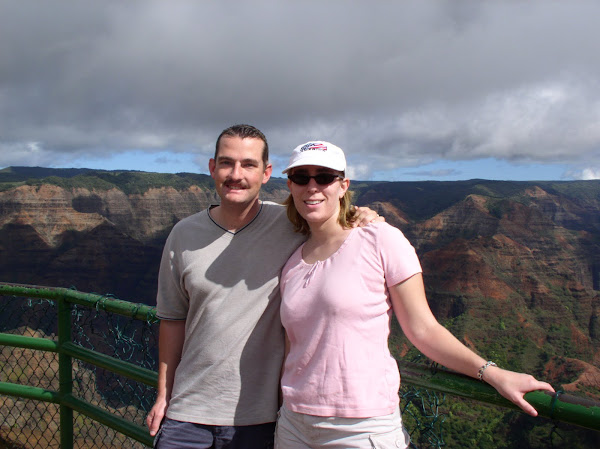I have mental health issues. I have Borderline Personality Disorder. This is a complicated disorder, but it all comes down to a shaky sense of identity: I never really know who I am. There are some other things that come into play, like depression, anxiety, abandonment issues, perfectionism, all-or-nothing thinking, and a number of other things. I've been dealing with this for about 10 years, but I've only known what it is for about 2 of those years. The rest of the time has been spent trying to figure myself out. Why do I do the things I do? Why are my personal relationships so complicated? Why can't I figure out what I want? Ever? Once I figured out the BPD thing, I could begin decoding these things. I could start to see my motivations for behavior. It's rough. It's a battle. I'm lucky. I have a superb support system, an understanding and supportive husband, and I'm surrounded by educated people who also want to help me understand.
One thing has always mystified me when it comes to my own case of BPD. Most people with BPD have suffered some sort of childhood trauma that involves a role reversal. Maybe they had a parent with mental or physical illness they needed to care for at a young age. Maybe they were the child of working parents who had to be responsible for younger siblings when they still needed their own parents. Maybe they were abused in some way, and had to find ways to cope with adult situations as a child. That's what usually leads to the identity difficulty. They see other kids their age doing kid-things, and they can't relate. They're children in a world that is asking them to be an adult.
I don't have any of those things in my past. I had a healthy, happy childhood. I was raised in a Christian home by both parents, and had a stay-at-home mom. I have never been in an abusive relationship, and while I've always been a little socially awkward, I have always had friends my own age. But for some reason, I developed the same borderline tendencies as someone who experienced significant childhood trauma.
So it's a lifelong search, really, trying to figure out what the trigger was. Does it matter? No, not really. In the end, the result is the same: I have BPD. But, I have always wondered how I got to be such an outlier. The other day, I had an epiphany. There have been 3 significant life events that account for my identity issues.
The struggle with infertility
All my life I've wanted to be a mom. I used to be a preschool teacher, and I would often find myself fantasizing about what my own children would be like. My husband and I agreed that we wanted children. We had multiple discussions about how we would raise them. We were looking forward to it. We were the classic young married couple dreaming about being parents. When we were finally ready, we tried. And tried. For 2 years. Then we saw a fertility specialist who (after running some diagnostics) informed us that while I was 29, my ovaries were 40. While we were trying to have children, my reproductive system was aiming toward retirement. She told us our only chance of getting pregnant was in-vitro fertilization with a donor egg.
A donor egg.
That would mean that if we chose to pursue this road, our child would only be half ours, biologically. We decided that to move forward with fertility treatments would be (for us) trying to get pregnant, not trying to have children. The distinction is important. Pregnancy is a one-time event. It happens, and then it's over. Having children is a lifetime commitment. Having children means shaping and training someone to be a productive member of society. It's a lifelong process. It was that process we wanted, not the event of pregnancy.
So now I knew I couldn't get pregnant. That was a big identity blow to me. As a female raised in a traditional Christian home, one of my "jobs" was to produce children. Not my only job. Not my only purpose. But it was certainly one of them. And now I couldn't do that. It felt like a very cruel cosmic joke. Who was I if I couldn't do this thing that I both wanted to do and felt I was expected to do? How was I supposed to fulfill my purpose?
The failed adoption
We decided to pursue adoption. We applied through the foster system in our county, and went through the process of becoming foster parents (a requirement in our state for adoption). We were matched with a sibling set of two: a brother and a sister. They were with us for 7 weeks before a family member stepped up and volunteered to take them. Federal law states that any biological family member within 5 degrees of separation can take custody of the children and be their foster family.
So one day, my husband and I took our two beautiful children and handed them over to the county to be placed with their family member.
I was so angry. So angry. I yelled, I threw things, I sat on the floor of my little girl's nursery and cried. I could accept that I wasn't supposed to have biological children of my own, but to have them taken away? What had we done wrong? Why would God do that? It's a good thing to want to adopt children from an unhealthy environment and raise them in a healthy one. How could this be what was best for them?
Again, I was faced with the possibility that I may never be a mom. Again, I struggled to understand who I was, if not who I was expecting to be.
It sent me into a crisis of faith, that lingers to this day in some ways. I was sure God couldn't be real. If He was, how could this be what He wanted for me? He wanted me to give up my children? He didn't want me to have any? Why had he given me the desire for children, if I was never going to have them? My head spun with questions, doubt, anger, bitterness, and despair.
Eventually, we did adopt two children, though not biological siblings. But my questions about God and the universe lingered, even though I had been granted that privilege. I made an effort to ground myself in the here and now. I had been wrong. God wasn't taking that opportunity away from me. He was granting it in a different way. Had I been allowed to suffer along the way? Sure. But without suffering there would be no compassion.
Losing music
The third thing that happened was a blow I still haven't completely worked through.
I have been singing in choirs, musicals, plays, and worship bands since I was 5 years old. I have always been involved in the music ministry at every church I've ever attended. Music was how I dealt with a lot of my mental health issues, particularly depression. Music was how God spoke to me the majority of the time. Both my parents make music, and it featured large in our family. I didn't make a career out of it (I always knew I wouldn't), but it has always been part of me. A symbol. Not just fun, not just challenging, not just rewarding. It was ME. I did music.
For a couple of years, I sang with the worship team at my church. One day, I abruptly received an email from the music pastor informing me that he didn't want me to do it anymore because I don't play an instrument.
Now, here's the thing: I don't play an instrument. I've never played an instrument. I play the piano just enough to help me with my singing. In elementary school I played the flute, but only for a couple of years. In high school I realized that my voice was my instrument. So I focused on that. I studied voice the way other musicians study their instruments. I took lessons, I sang in academic choirs, I studied difficult pieces for my recitals. It made no sense to play a guitar or drum or piano because I already played an instrument. One I could take with me everywhere I went, practice at any time, and find multiple ways to share with others.
I honed my ear and learned to create harmonies on my own, on the fly. I sang with friends and family, with church members, with professors, I've recorded a few times. In the midst of everything that happens in life, I always found a way to have music.
Had we not had children, we would have looked for a new church where I could do music. But, our children have friends at church, and our church is very invested in families and what they need. I felt we needed to stay here to maintain stability for our kids. But that means I have to figure out my role. I don't get music anymore, so who am I?
And THAT is the basis of my identity issues. I have had more than one experience that showed me I'm not who I thought I was, and no answers as to who I really am. Things outside my control happened that dismantled who I thought I was. These were not choices I made, they were unexpected happenings. That is what makes them so devastating.
Now, knowing this doesn't fix my issues. It doesn't tell me who I am or what I'm supposed to do. But it does tell me that I have had some life experiences that strike at who I am on a fundamental level.
If you or anyone you know has experienced something like this, please listen: be there for them. They will push you away. Stay. They will say things that make no sense. Listen. They will try to manipulate you to do things their way. Calmly tell them you will not be manipulated, and you love them. Love them. Read about this condition. Talk to people who know. Try to understand.


